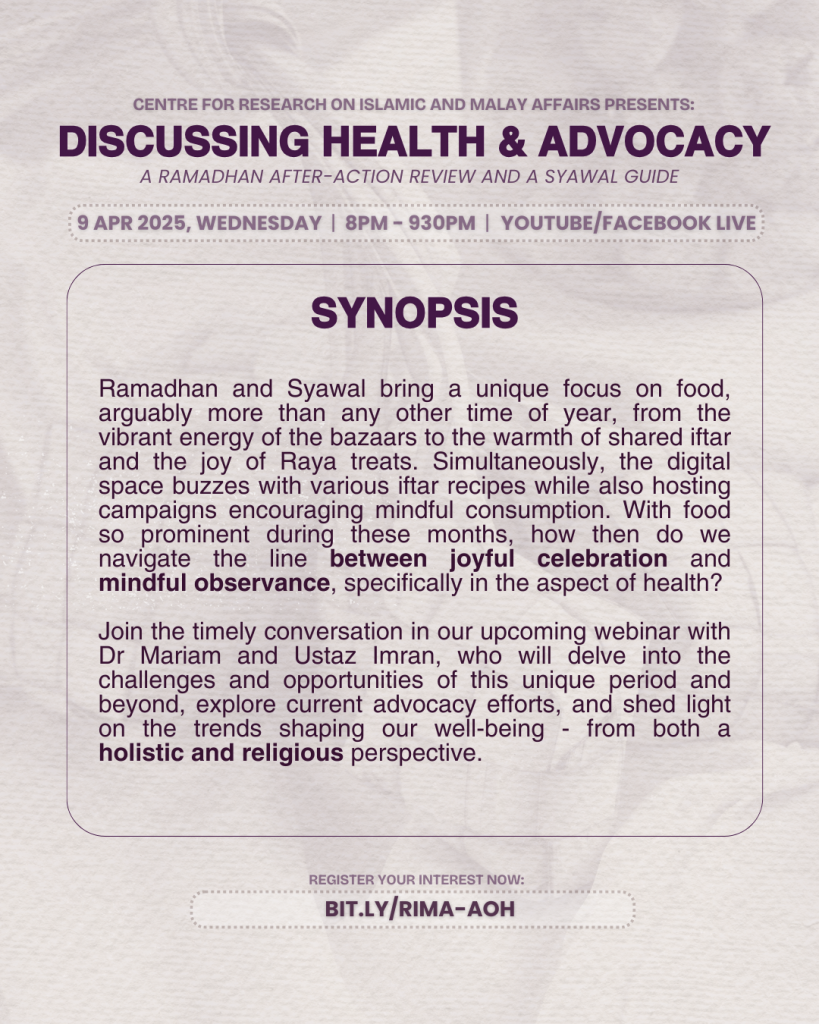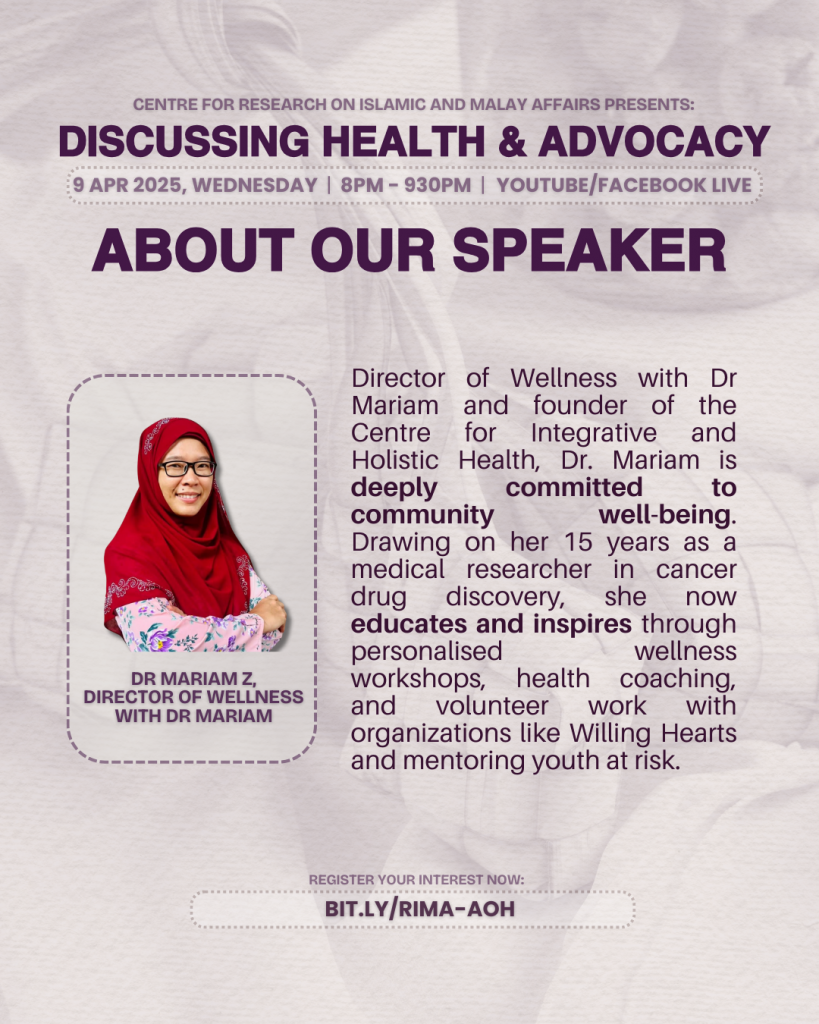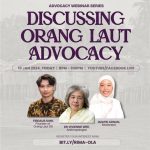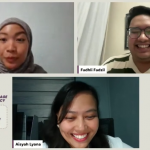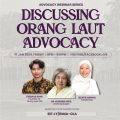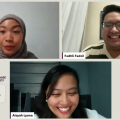RIMA Brief – April 2025
Discussing Health Advocacy in Singapore
Speakers: Dr Mariam Z, Ustaz Imran Othman
Click here to watch the Webinar
Key Takeaways
1. We have more control over our bodies and their responses than we think, and our choices play a significant part in preventive measures.
2. Halalan toyyiban: food and drink that is both permissible and beneficial is best, as not everything that is lawful can be assumed to be good.
3. Being conscious of what we consume is not to weaponise food. There is plenty in our cultural and religious foods that is healthy and beneficial.
4. There are so many more aspects to well-being beyond food and consumption — for instance, mental, emotional, and other aspects of physical health. Other lifestyle choices like practising mindfulness and good hygiene too make a difference.
5. Health is an ongoing journey that takes time, and we should encourage each other to better our health as a community.
8. Above all, moderation is key!
Background
In 2023 Singapore was declared a ‘blue zone’, a label accorded to only six areas in the world. Blue zones refer to places where people live longer than average, experience strong community bonds, and generally practice healthy lifestyles.
However, unlike the other five countries whose labels emerged naturally from long-standing established cultural traditions, Singapore’s accolade was said to be through an “engineered” or purposefully and intentionally created lifestyle, thanks to a heavy hand in health regulations. Mandatory nutrition labels on food packaging, strict taxes on cigarettes and alcohol, and free-of-charge fitness trackers are only a few in a long line of policies and campaigns encouraging Singaporeans to make better health choices.
Does the same reputation extend to the Malay/Muslim community? While admired for its rich, decadent dishes, Bin Khidzer writes that “sickly, idle and risky minorities” has been a popular narrative in the coutnry when it comes to diseases such as diabetes. This Islamic month of Syawal especially, after a month of abstaining from food, drink, and other vices, is inextricably linked to food festivals, bazaars, and homes full of delicacies.
This webinar asks: How do we balance important cultural practices with taking good care of our bodies? What are some current health initiatives and how can they be made more effective? And what does it mean to be healthy, anyway?
We heard from Dr Mariam, founder of the Centre for Integrative and Holistic Health and Director of Wellness with Dr Mariam, who aims to empower the community towards healthier and more fulfilling lives. Ustaz Imran, senior head of the Office of Imam at Al-Ansar Mosque, provided an important Islamic viewpoint with regards to health and wellness from the Quran and prophetic traditions.
Health Advocacy And Initiatives
In 2014, Singapore’s Health Promotion Board (HPB) updated its longstanding Healthy Diet Pyramid to a new guide called My Healthy Plate that focuses on proportions of different food groups instead of a certain number of calories per day. The colourful visual boasts half a plate filled with vegetables and fruits, a quarter with grains, and a quarter with meat or other sources of protein. Dr. Mariam elaborated on the new guide to viewers, sharing that the same guide was being promoted by the World Health Organisation as well.
There are specific campaigns targeted towards the Malay/Muslim community in the fasting and festive periods. The Korang Ok? (“Are You OK?”) initiative by HealthHub and HPB runs seasonal Ramadan and Hari Raya campaigns called “Kita Dah Cukup Manis, Kurangkan OK?” (“We are sweet enough, reduce it OK?”) to promote healthy eating and lifestyle habits. However, in terms of reception, while the speakers said that they did not have access to official statistics and evaluation, some initiatives were not met with very favourable responses on the ground.
For instance, when mosque personnel served sardines instead of red meat, or when HPB distributed over 1,000kg of brown rice to be served during iftar at mosques in 2019, congregants were not too pleased. Many are already comfortable with and quite used to what they have received all these years and unfortunately are only more aware or motivated to change after they get a certain sickness. By then, however, solutions may be more limited.
But our advocates are not deterred. They understand that changing habits is not easy, especially with issues like food and lifestyle, so public initiatives need to be slowly introduced and backend with reasoning instead of being forced wholesale to others without awareness. Perhaps an alternative approach in the future could be to serve mixed brown and white rice instead, coupling gradual endeavours with education until it becomes acceptable and normal to the masses.
Their general advice was that health is a journey that takes time, and to not give up if there have not been huge successes in changing habits. It may take at least one or two months for a new habit to stick and having accountability partners can be a huge help. With more self-awareness in our community, especially if we eat together at home and in mosques, we can encourage each other to better our health as a community.
Another point raised during the dialogue was on the notion of mindset shifts — health does not have to be expensive. Over the years, the idea of organic, quality ingredients has become synonymous with higher expenses. In this webinar, Dr Mariam reflected on her own experience in her health journey, when she started off thinking “Everything must be organic!” but gradually realising that this was not financially sustainable. She suggested reconsidering what is really necessary that is also within one’s budget (not everything has to be organic), and to be creative when preparing food or when choosing what to eat.
The future is not bleak. On the ground, there has been a lot more awareness and people who are interested in improving their health; Dr. Mariam was especially heartened that there is a lot more holistic health programmes nowadays. Through her work, she found that people are aware of the general best practices although there was a need for more education in specific areas. She believes that COVID-19 was one of the large-scale issues that made people more aware of the urgency of hygiene and having good health. Ustaz Imran shared that he had a colleague who was facing difficulties in standing up in prayer and had to be seated throughout, but with motivation and a change in diet, his condition gradually improved and he could pray while standing.
Conclusion
There are so many aspects to health and well-being that it may get overwhelming at times. In the Q&A, Dr. Mariam advised viewers on how to seek health information online, and to be discerning when it comes to using search engines for different medical queries. While it is good to look up information on the web and keep up-to-date on the latest research and studies, we must be careful in the credibility of the information we consume. Additionally, as health is something extremely personal and subjective, going to a doctor and getting professional advice is sometimes necessary as well. It may also be helpful sometimes to work together with other health professionals such as health coaches like herself or even mental health and other practitioners, to help keep the progress on track.
Ultimately, moderation is key. It is important to keep cultural practices alive as our traditions and celebrations are integral to our identity. At the same time, as Muslims, we recognise that our body and health are blessings from Allah s.w.t., and it is our amanah (responsibility) to take care of ourselves, and to consume and practise halalan toyyiban. We can have our cake kueh and eat it too.
Click on the link to download and read the full RIMA brief – _RIMA Health and Advocacy Brief


